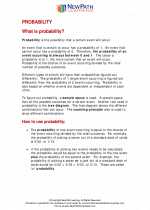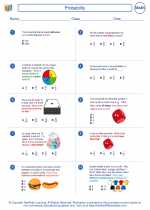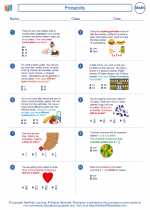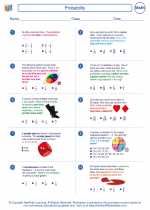Experiments
An experiment is a scientific procedure used to test a hypothesis, demonstrate a known fact, or examine the effects of a particular factor. In the field of mathematics, experiments are often used to gather data and test mathematical theories.
Types of Experiments
There are two main types of experiments: controlled experiments and observational experiments.
- Controlled Experiments: In a controlled experiment, the researcher manipulates one or more variables and measures the effect of the manipulation on other variables. This type of experiment helps to establish cause-and-effect relationships.
- Observational Experiments: In an observational experiment, the researcher observes and measures phenomena without manipulating any variables. This type of experiment is useful for studying natural occurrences and relationships.
Steps in Conducting an Experiment
When conducting an experiment, it is important to follow a series of steps to ensure accuracy and reliability of the results:
- Identify the Problem: Clearly define the question or problem that the experiment aims to address.
- Formulate a Hypothesis: Develop a testable prediction or statement that can be verified through the experiment.
- Design the Experiment: Plan and organize the procedures and materials needed for the experiment, including the control and experimental groups.
- Conduct the Experiment: Follow the experimental procedures, collect data, and make observations as planned.
- Analyze the Data: Organize and interpret the data collected from the experiment to draw conclusions.
- Draw Conclusions: Use the data and analysis to determine whether the hypothesis was supported or refuted.
- Communicate Results: Share the findings and conclusions of the experiment through a formal report or presentation.
Key Concepts in Experiments
When studying experiments, it is important to understand the following key concepts:
- Independent Variable: The variable that is manipulated or changed by the researcher in an experiment.
- Dependent Variable: The variable that is measured or observed to determine the effect of the independent variable.
- Control Group: The group in an experiment that does not receive the experimental treatment and is used for comparison.
- Experimental Group: The group in an experiment that receives the experimental treatment or manipulation of the independent variable.
Study Guide
To prepare for a test or assessment on experiments, consider the following study guide:
- Review the steps involved in conducting an experiment and understand the purpose of each step.
- Practice identifying the independent and dependent variables in different experimental scenarios.
- Compare and contrast controlled experiments and observational experiments, and be able to provide examples of each type.
- Understand the importance of a control group in an experiment and its role in establishing causation.
- Review the key concepts related to experiments, including variables, control groups, and experimental groups.
By mastering the concepts and principles of experiments, you will be well-prepared to analyze and conduct scientific investigations in the field of mathematics and beyond.
[Experiments] Related Worksheets and Study Guides:
.◂Math Worksheets and Study Guides Sixth Grade. Probability

 Worksheet/Answer key
Worksheet/Answer key
 Worksheet/Answer key
Worksheet/Answer key
 Worksheet/Answer key
Worksheet/Answer key
